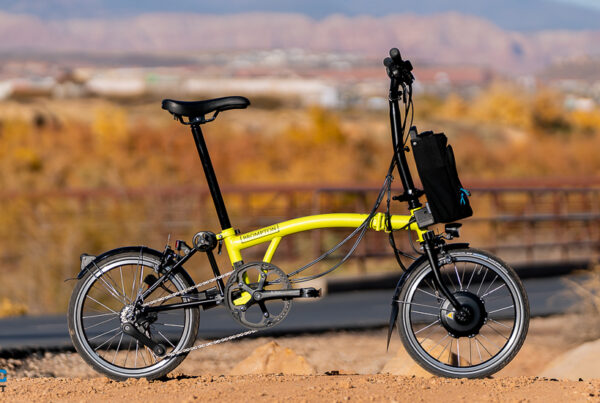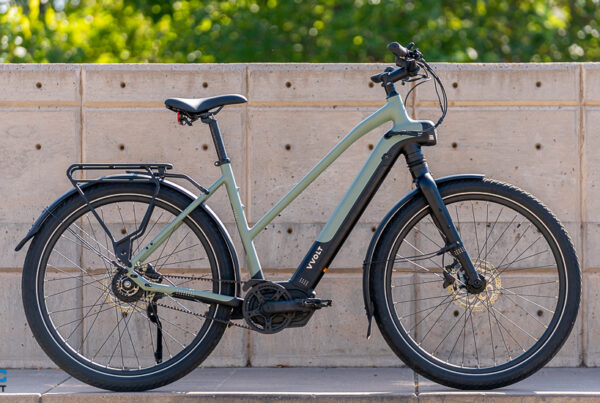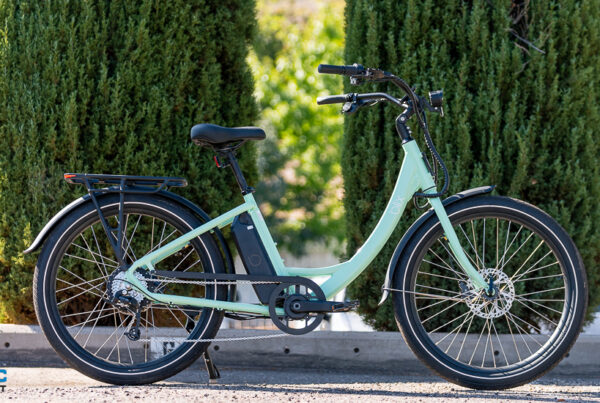In this week’s news:
- Pivot’s First Drop Bar, Carbon eBike
- Crow Crowdfunds eGravel Bike
- Revel’s New Subscription Only eBike
- Dragon Hyperscooter a Step Closer?
- More eMobility for Scotland
- Will Michelin Minimise their Carbon Footprint with Windpower?
- LEVA-EU’s Radical Zero Emission Vehicle Proposals
New eBikes & eBike Systems
New Carbon-framed eGravel Bikes from Pivot and Crow
Pivot’s E-Vault is carbon and high tech…..
The new Pivot Cycles E-Vault is a carbon-framed dropbar eBike packed with high end tech including hollow core internal molding technology on the frame, Fazua mid-drive motor system that Pivot say ‘disengages completely so you can pedal without resistance at the push of a button’ (and the battery and much of the motor can be quickly removed if you want a ‘regular’ cycling experience) plus there is electric shifting and wireless data connectivity.
It’s described as being at home on city streets, gravel roads, rocky pavements or hardpacked singletrack. To keep it true to Pivot’s style, this new E–Vault is available in one build only: the top build. If you are a fan of high tech fitness riding the E-Vault sounds right up your street as Pivot say ‘Riders can customize their electric shifting experience, power output, integrate all their personal, fitness and bike data in one spot, allowing riders to extract more performance from their bike than ever before.’
The RRP of US$9,999 also marks the bike out but for that you get the world’s first gravel-specific electronically shifting drivetrain, the GRX Di2 with carbon wheels build meaning a claimed weight of circa 29lb / 13kg (with the battery and drive unit removed it is claimed to weigh 22.63lbs / 10.25kg).

Crow’s first ever bike is an eGravel bike with removable Fazua mid-drive
Crow are a startup whose high-end carbon gravel eBike is about to start crowdfunding. Like the Pivot, it uses the removable Fazua mid-drive and also packs carbon fiber forks and ‘proven top-of-the-line components from Shimano, SRAM and Ritchey, and hydraulic disc brakes for exceptional stopping power.’ Sign up to the crowdfunding launch if you want to learn more details in the near future.
Fancy a US$99 eBike?

Wing makes these e-bikes for New York based Revel and they are available for US99 per month
OK, it is too goo to be true as this is a monthly subscription price and you have to be a resident of New York City, all as reported in this Verge article.
Revel, the company behind this move, started life as a moped hire company and this move marks its first adventure into the e-bike world. As The Verge points out, it’s aimed at getting urbanites to use a Netflix type subscription model for transportation. Clearly Revel believe it will appeal to time-poor urbanites as they receive one of the e-bikes pictured above, manufactured by NYC-based e-bike company Wing delivered straight to their door plus a service package.
The Verge add ‘The price also includes complimentary maintenance, including flat tires fixes, loose chains repairs, or brake upkeep. Service requests can be submitted via Revel’s smartphone app, and Revel says a repair technician will respond within 24 hours. The company will also supply a bike lock and educational material to help subscribers navigate New York City’s less-than-bike-friendly streets.’
And of course, the more average e-bike prices head upwards the more offers like Revel’s will be regarded as an affordable alternative.
The Steeron – Half eBike, Half eScooter
Cologne start-up Steeron has just presented two new e-bike style e-scooters, or possibly e-scooter style e-bikes – the C20 and C25 models are said to fit easily into the trunk of a car and are available in more than 30 colors.
The front hub motor and battery look to be straight off an e-bike manufacturer’s drawing board whilst the rest of the spec signals that the new models are a step up in comfort and stability compared to their predecessor models as the C20 and C25 models have larger wheels with pneumatic tires, longer wheelbase and optional suspension seat post (though there is also some folding capability).
Both models have a 500 watt rated motor and a removable battery with claimed range of around 30 miles and a top assisted speed of 12.5mph or 15mph.
The C20 model comes without a seat and is approved as a small electric vehicle meaning that, under German law, it can be ridden on roads and bike paths without a helmet. The C25 comes with a seat and (as it has no pedals) is legally equivalent to a moped. In addition to German roads it can be ridden on cycle paths marked as “moped-free” but requires registration, insurance and driving license.
Deliveries are planned to start in April 2021 with RRPs starting at €2999 though there are early bird discounts.
New eScooters
Meet the Futuristic Dragonfly Hyperscooter – Is it Really on the Cusp of Reality?

Although publicity for it has been around a while, the premium-priced Dragonfly Hyperscooter is said to be just months away – according to Dragonfly’s website that is.
The Dragonfly Hyperscooter claims to take safety to the next level, with stability coming from either three or four wheels, automotive-grade headlights and turn signals, pavement projection lasers and on-board acoustics for pedestrian awareness and audible navigation. Add front and rear braking and suspension, puncture-proof tyres and an anti-rollback and you can see why it claims to put safety first. Top speed is quoted as 25mph but the website notes that some jurisdictions limit e-scooter speed to 15mph.
Although the Hyperscooter has been a regular in future transport type articles for the last couple of years, Dragonfly’s website says ‘We have pre-production arriving in January 2021 and we anticipate production deliveries to start shipping in April 2021.’ On price, they say ‘Dragonfly will have a sales price no higher than $3,900 to $4,500 depending on your choice of 3 wheel or 4 wheel version.’
Get Inspired
Scottish eBike Projects Get £600,000
Bikebiz reports on how the Scottish Government has awarded over £633,000 to support 45 e-bike projects across the country.
‘Through the latest round of the eBike Grant Fund, delivered through Energy Saving Trust, schools, hospitals and community groups will establish projects to adopt e-bikes, adaptive bikes and e-cargo bikes as an alternative to car journeys.’ says the article.
For example in Golspie, Cycling UK Scotland will work with key workers to provide access through a new pool of eight e-bikes whilst in Glasgow and Edinburgh, Simon Community Scotland is being provided with a grant of almost £16,000 to support its outreach work in helping vulnerable people through the assistance of e-bikes.
Infrastructure
Mobility Hubs Heading Scotland’s Way
Staying in Scotland and still with Bikebiz who say ‘mobility hubs’ are set to ‘revitalise’ city centres in Scotland.
According to Bikebiz ‘Mobility hubs are particularly common in Germany and Austria and other countries on the continent as a way of “revitalizing” city centers….Hubs bring together public transport stops for buses, trams and trains with bike share schemes, car clubs, e-scooters, electric vehicle charging points, bike racks and shared taxi rides, as well as community facilities such as cafés, fitness areas, green space, package collection points and wifi and phone charging – all with covered waiting areas, real-time journey planning information, walking areas and disabled access.’
Sustainable Tech
As an e-bike fan you might well know the name Michelin but are probably not familiar with French firm Neoline. Now the two could be teaming up in the future to help Michelin decarbonise its shipping operations, as reported by Cleantechnica.
Apparently Michelin Group recently signed a transport commitment with Neoline with the aim of using the latter’s planned decarbonized shipping service which relies on clean and renewable wind energy as the main propulsion for its 136m long cargo ships with 4200 m2 of sails, claiming to reduce by 90% the CO2 emissions related to transatlantic maritime freight transport.
A first concrete step is for the Michelin Group to use the Neoline pilot line from Halifax (Canada) to Saint-Nazaire – Montoir de Bretagne (France) by 2023 the article tells us.
eBike Safety
Streetsblog USA bring us disturbing news:
‘As part of its 2020 Cycling Deaths project, journalists at Outside Magazine analyzed media reports about 697 fatal cycling crashes and found that more than a quarter (26.3 percent) of drivers who killed a cyclist last year fled the scene of the crime. The official federal statistics about hit-and-run rates won’t be released for approximately two years, but the magazine noted that the data, which was analyzed with the assistance of information scientists at BikeMaps.org, is likely a strong representative sample of a death toll whose “total is likely significantly higher.”
If that’s true, 2020 may be among the worst years on record when it comes to dangerous drivers leaving their victims to die.’
eBike Law
LEVA-EU’s Radical New 30mph Call for Reform to EU Commission

LEVA EU want a new class of ZEVs with their own legal and safety standards to stop discrimination against them and promote their use
The trade body for light electric vehicles in Europe, LEVA-EU clearly think that well-developed cycle lane infrastructure can handle larger and faster electric vehicles – they have set out a radical agenda for ZEVs – co-called Zero Tailpipe Emission Vehicles.
They give an example to show how very similar machines are currently discriminated against by current legislation with only a modest increase in power and weight making a vehicle effectively a ‘non’ e-bike and also highlight what is a more important criterion for classifying vehicles, kinetic energy; a pedal assisted bike 25 km/h – 250W develops exactly the same kinetic energy as that same vehicle with, for instance, 300W. However, the first is excluded from type-approval, comes under the Machinery Directive and has the same status as a conventional bicycle in all EU member states. The 300W edition is an L1e-A, needs type-approval and does not have a clear status in most member states. The first one is selling by the millions, the second one is virtually non-existing.’
They conclude:
“LEVA-EU insists that speed and weight limits must be set in consultation with the ZEV sector. Because the voice of the sector is drowned out by the voice of parties who consider ZEVs an existential threat, from which they must protect their business, the Commission has not yet entered into an in-depth dialogue with the sector. LEVA-EU calls on the Commission to no longer postpone that consultation.”
In the document, LEVA-EU also calls for all infrastructure, such as cycle paths, cycle streets, cycle highways and cycle parking, to be renamed as ZEV infrastructure. Traffic signs, it says, should also reflect ZEVs, a measure it believes would improve cyclists’ and motorists’ perception of ZEVs.
LEVA-EU proposes to add an article to Regulation 168/2013 (the EU law defining what is and what is not an e-bike), excluding ZEVs with a maximum design speed not exceeding 50 km/h / 30mph and to also exclude all ZEVs from the Machinery Directive. As a result, this simple legal intervention would exclude all types of electric cycles, cargo-cycles, e-scooters, monowheels, e-hoverboards, self-balancing vehicles and any other Zero Tailpipe Emission Vehicle not yet mentioned explicitly in law today, from the current legal framework, which is totally inappropriate and inaccurate.’
Instead, LEVA-EU proposes to transfer ZEVs into a new horizontal Vehicle Regulation. This European law would specify essential safety requirements, to be complemented with harmonized standards and possibly, for certain ZEV-categories, type-approval procedures. In any case, LEVA-EU believes that the form of the legislative framework needs to be decided in consultation with the ZEV-sector.
The measures, which also include a new way to regulate speed and a simple categorization based on speed and weight only, are detailed in a position paper the body has submitted to the European Commission. LEVA-EU Manager Annick Roetynck said bringing in the concept of Zero Emission Vehicles (ZEVs) would finally set them apart from vehicles such as petrol engine motorbikes and mopeds, when it comes to the lengthy, inaccurate legislation manufacturers must navigate.
The full position paper on the review of Regulation 168/2013 is available here.
The position paper on the review of the Machinery Directive is here
Bafang Mid-drive Certification is a ‘Green Light’ to Enter North American Market
On February 9, 2021, Chinese-based Bafang Electric was awarded the UL 2849 certificate, the first mid motor UL certificate in China.
The move has been described as a ‘green light’ to enter the North American market and beyond by Bafang who say the UL-certified mid motor will be launched together with the new DIY M625 and M325 drive.
It’s an interesting development that might signal a weakening of the hold of European and Japanese based companies on the mid-drive market and one that might put pressure on them to bring down mid-drive bikes that tend to cost significantly more than hub drive bikes – up until now Bafang’s true area of expertise.
eBike Biz
Super 73 Lands $20 Million Investment
Super73 which specialises in fat-tired, throttle powered e-bikes which it sells online has announced it has landed a $20 million investment via Volition Capital, a Boston equity firm. The funding comes two weeks after Rad Power Bikes announced a $150 million investment.
Super73 was founded in 2016 with a Kickstarter campaign. It is based in Irvine, California, with European headquarters in Amsterdam and is known for its distinctive moped-style design and list A-list celebrity endorsements.
“Super73 has all the ingredients to become a great consumer brand – fanatical customers, insatiable demand for its products, and a distinctive design philosophy,” said Larry Cheng, Managing Partner, Volition Capital. “It is one of the fastest growing companies we’ve ever invested in, and are poised to build a great new American brand as it leads the e-bike market for years to come.”
With e-bike sales heading ever upwards in most countries expect more investment news like this!
Gocycle to Open Euro Subsidiary

The last five years have seen phenomenal business growth for Gocycle based on its wholly original design
Owing to increased demand folding and demountable e-bike manufacturer Gocycle has begun the formation of a European subsidiary to support further growth say the company. The new Gocycle EU division, a Netherlands-based European subsidiary will include localized EU wide fulfilment from a central distribution centre in Germany. The warehouse will stock and distribute Gocycle products and accessories, fulfilling the brand’s orders across the European Union.
The news comes on the back of 25% sales volume increase in each of the last five years and a 50% rise in 2020.
Stay tuned for more e-bike news and reviews and thanks for reading!
Rich
Related
Source link

![eBikeNews: Pivot’s New Carbon, Revel NY eBike Subscription, Futuristic eScooters and Much More! [VIDEOS] | Electric Bike Report | Electric Bike, Ebikes, Electric Bicycles, E Bike, Reviews](https://cyclereview.b-cdn.net/wp-content/uploads/2021/04/eBikeNews-Pivots-New-Carbon-Revel-NY-eBike-Subscription-Futuristic-eScooters.jpg)






